The New Jersey eviction process is more complicated than in more landlord-friendly states. You need to have a clear understanding of the different notices required, specific information that must be provided to your tenant and time requirements for notices.
Make even a minor mistake along the way and you will have to start all over again. That will cost you time and money!
I spent a lot of time researching the New Jersey eviction process even though I have never had to evict a tenant yet. However, I don’t want to wait until I need to evict someone to learn the complicated eviction process.
Previously, I highlighted some quirky New Jersey eviction laws and the only valid reasons a landlord can evict a tenant in New Jersey.
In the final article of this 3-Part series, I am going to walk you through the New Jersey eviction process step-by-step so you know what to do when the inevitable finally happens and you need to evict a tenant.
Specifically, I will show you:
- A comprehensive overview of the New Jersey eviction process and timeline
- What it will cost to evict a tenant in New Jersey
- Smart tips to navigating the New Jersey eviction process
New Jersey Eviction Process & Timeline

How long an eviction process will last depends on a number of factors. The reason for the eviction will play a big role in determining the time necessary to complete an eviction. Failure to pay rent is the most common reason and is often the quickest. However, any mistakes in the eviction process can set you back significantly.
The type and quantity of notices required to send a tenant before moving to the formal eviction process will also impact how long the whole process will take. Generally, the more notices you have to send, the longer the process will take. It also depends on the type of notice required. Every type of notice has a required amount of time to pass before you can proceed to the next step.
A typical New Jersey eviction process will take anywhere from 6 weeks to 6 months but they can drag on for much longer if you aren’t careful.
Below is a broad overview of what you can expect in the NJ eviction process.
Step 1 (0 Days) – Determine The Type Of Notice Required
The first step in any eviction is to determine what, if any, type of notice is required and how long you need to give a tenant to fix the issue before you can file for eviction. There are several types notice required under New Jersey eviction laws and various time requirements depending on the reason for the eviction.
- No Notice Required. Non-Payment of Rent is the only violation for which no notice is required under NJ eviction laws. You can file for eviction as soon as a rent payment is late. You do not have to send your tenant a notification that you intend to file for an eviction. However, best practice is to give your tenant a chance to pay you before moving immediately to the courts. You should honor your lease’s grace period if applicable. NOTE: 14 day notice is required if rent is federally subsidized (e.g., Section 8).
- 3-Day to 3-Year Notice. Other violations or causes for evictions come with various lengths of notice requirements. See step 2 for details.
Step 2 (3 Days to 3 Years) – File Proper Notice
There are various requirements for sending proper notification to tenants when you want to evict under New Jersey eviction laws. Be sure to follow the procedure EXACTLY for the specific cause for eviction under which you are seeking judgment. If not, your tenant will have a valid defense and you will have to start the eviction process all over again.
As you can see below, this can set you back years in extreme cases.
3-Day Notice – Various causes for eviction
- Disorderly Conduct
- Damage or Destruction of Property
- Tenancy based on employment that has been terminated (e.g., an onsite Super)
- Conviction of a drug offense committed on the property
- Conviction of Assaulting or Threatening the Landlord, His Family or Employees
- Civil Court Action that Holds Tenant Liable for Involvement in Criminal Activities
- Conviction for Theft of Property
14-Day Notice – Failure To Pay Rent
- Only required if rent is federally subsidized as under Section 8
1-Month Notice – Various causes for eviction
- Substantial violation of Landlord Rules and Regulations
- Violation of Lease Covenants
- Failure to pay Rent Increases
- Failure to accept reasonable change in lease
- Tenant habitually pays rent late
3-Month Notice
- Health/Safety Violation and Removal from Rental Market
18-Month Notice
- Landlord wants to permanently remove the property from residential use
3-Year Notice
- Rental is being converted to a Condo or Coop
Types of Notices
There are two types of notices under NJ eviction law. Here are the proper definitions and when to use them.
Notice To Cease
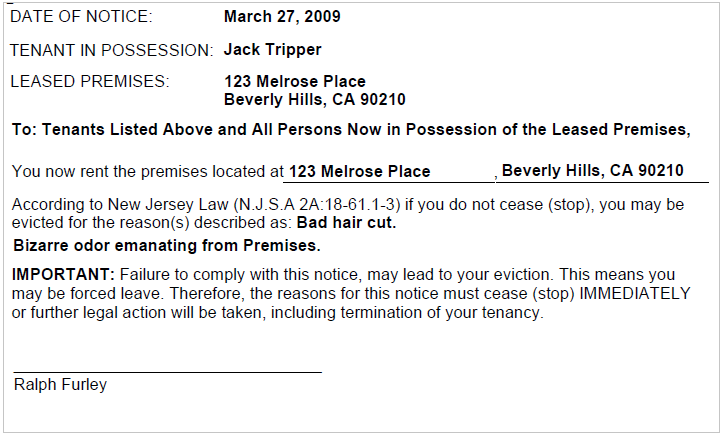
A Notice To Cease tells your tenant to stop violating lease provisions or acting disorderly. This is essentially a warning to your tenant. If your tenant stops the actions specified in the Notice To Cease, then you will not proceed with the eviction process.
This notice is required before filing for an eviction under the following causes:
- Disorderly Conduct
- Damage or Destruction of Property
- Substantial violation of Landlord Rules and Regulations
- Violation of Lease Covenants
- Tenant habitually pays rent late
This is also called a “Notice to Cure” or “Cure Or Quit” notices in other states.
What to include in the Notice To Cease
The general rule is to be as specific as possible. Leave no doubt in the tenant or judge’s mind as to what the tenant needs to cease. Include the following:
- The date the Notice is served
- Signature of the person serving the notice
- Name of tenants listed on the lease,
- Property Address
- Which NJ Eviction Law applies to your situation
- All relevant specifics and dates regarding their violations
- Clearly state you intend to pursue an eviction if the violation isn’t corrected
Here’s an example of a New Jersey Notice To Cease.
If the tenant continues with the lease violation, then you will follow up with a Notice To Quit.
Notice To Quit
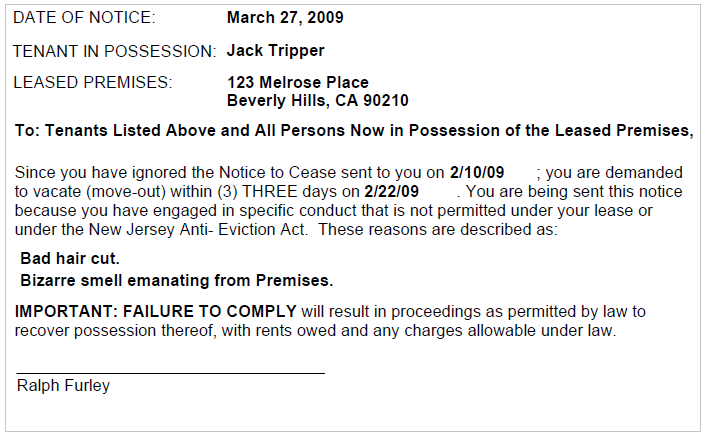
A Notice To Quit tells your tenant that you are ending the lease and intend to evict them. However, the tenant is not required to move until the eviction process is complete and the Sheriff comes to remove the tenant.
What to include in the Notice To Quit
Again, be very specific in describing the reason you are ending their tenancy. The following should be included:
- The date the Notice is served
- Signature of the person serving the notice
- Name of tenants listed on the lease,
- Property Address
- Specific reason why the lease agreement is being terminated
- How many days the tenant has to fix the problem before eviction proceedings begin
- The specific date the tenant must leave the property if the issue is not resolved
- A statement of “Demand for Possession”
See example New Jersey Notice To Quit.
PRO TIP: Your New Jersey lease needs to include a right to re-enter the property clause should the tenant violate the specific clause being violated. Without this provision, you may not be able to evict a tenant for a lease violation other than non-payment of rent. Here is a sample Re-entry clause:
RE-ENTRY: The Landlord reserves the right of re-entry. This means that if the Tenant violates the terms of this Lease, the Landlord may terminate this Lease and regain possession of the Property. This is done by a court proceeding known as an eviction. A complaint is served upon the Tenant and the Tenant must appear in court. The Landlord may also evict the Tenant for any other cause which is permitted by applicable law. When the eviction proceeding is concluded, the Landlord may regain possession of the Property.
How To Serve A Notice To Cease Or Quit
What the NJ eviction law says:
Notices shall specify in detail the cause of the termination of tenancy and shall be served either personally upon the tenant or lessee or such person in possession by giving him a copy thereof, or by leaving a copy thereof at his/her usual place of abode with some member of his family above the age of 14 years, or by certified mail; if the certified letter is not claimed, notice shall be sent by regular mail.
What I think it means:
You can either (1) Serve it in person to the tenant or a resident older than 14 (2) by Certified Mail with Return Receipt or (3) Regular mail if the Certified Mail is refused
Best practice is to have an independent 3rd party deliver the notice in person and obtain a signature. This will ensure your complaint is not thrown out of court for failure to provide proof the notice was properly served.
Step 3 (1 Day) – File An Eviction Complaint
Evictions in New Jersey must be filed in the Landlord/Tenant Section of the Special Civil Part Court in the county where the rental is located.
Forms You Will Need To File
Verified Complaint – A form that details the reasons for the eviction whether for non-payment of rent or other reasons. New Jersey Verified Complaint form.
Summons and Return of Service – The notice to the tenant that they need to come to court to defend themselves from being evicted (other than non-payment of rent). New Jersey Tenancy Summons and Return of Service form.
Certification – A form declaring you have complied with the necessary steps in order to proceed with an eviction trial. New Jersey Landlord Certification form.
Information You Must Include
- Your name, address and contact information
- Defendant’s Name and Address
- Information specific to the reason you are filing the complaint
- Attach all applicable notices previously sent to the tenant
You will need two copies of all forms for each defendant.
Step 4 (2-3 Weeks) – Court Hearing
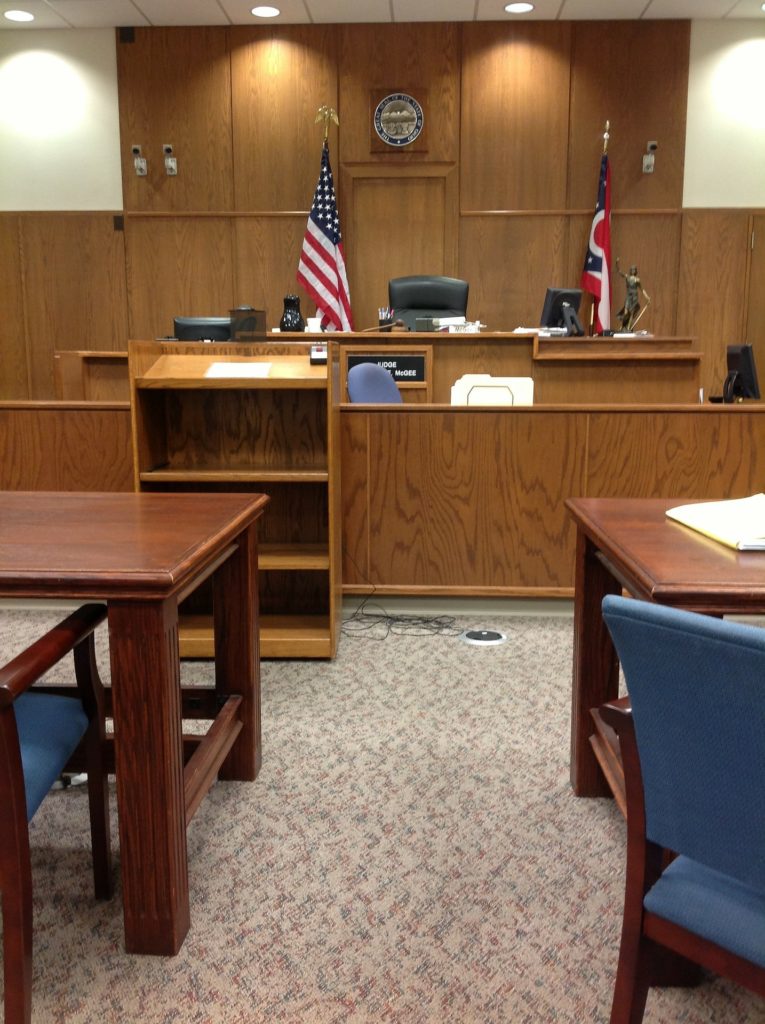
Once the proper paperwork has been filed, the Landlord will be notified of the court date. This is typically 2-3 weeks from the filing of the complaint depending on the backlog of complaints.
How To Prepare For Your Day In Court
Preparing for court may seem like a huge task but you can make sure you’ve covered everything with a common sense approach. Put yourself in the judge’s shoes and ask yourself “why should I believe what this landlord is telling me?”
Bring to court anything and everything that provides evidence for what you have claimed in your paperwork. If you are filing for non-payment of rent, then you need to be prepared to show your rent collection process and how the tenant failed to pay per the lease.
Things You Should Typically Bring

This list isn’t exhaustive but here are a few things you will generally want to bring.
- Copy of your deed
- Copies of the signed lease
- Copies of the eviction forms
- Rent Collection Ledgers
- Copies of communication with defendants
- Photos providing evidence of lease violation or damages
- Repair estimates or receipts
- Other evidence of tenant violations
Note that you cannot bring written statements to court. You must arrange to have a witness present if you need to rely on a witness’s statement to prove your case.
Step 5 (1 Day) – Day Of Trial
Both the landlord and the tenant must appear in court at the time and date stated on the summons. If the tenant fails to appear, the judge will issue a default judgment in the landlord’s favor. If you fail to appear, the case will be dismissed.
How To Win In Court
- Come Prepared With Documentation. Bring extra copies of everything you are planning to present as evidence and all eviction forms. Three copies should be sufficient. Also bring your tenant file which should include a copy of your rental ad, lease, maintenance records, rent payment log, move in condition report and records of conversations.
- Check Your Emotions. Present the facts of your case. Leave the emotion at home. The more clear, concise and professional you appear the better your chances are of winning.
- Lineup Witnesses. Written statements are not allowed in New Jersey tenant-landlord courts. You will need to make sure your witnesses are prepared to testify on your behalf.
- Lawyer Up. Have a lawyer represent your LLC or corporation, as you are not allowed to do this yourself if the property is owned under a different entity other than sole proprietorship or partnership. See Quirky NJ Eviction Law #2.
- Dress For Success. A suit and tie may be overkill but avoid the overalls and paint-stained shirt.
- Wait Your Turn To Speak. The judge will let you know when it’s time to state your case by addressing you directly. Do not interrupt the tenant or the judge. Do not speak directly to the tenant. Address the Judge. Only interrupt if you object to a statement or evidence made by the tenant.
You Must Try To Work Things Out Before Seeing The Judge

You will be asked to try and work things out with the tenant prior to meeting with the judge. Go into this process knowing your negotiation position. Come prepared to make a deal that will be minimally acceptable. Don’t be greedy and expect to win everything. You are much better off negotiating a settlement than you are taking your chances in front of a judge.
- Are you willing to accept a payment plan?
- Are there any circumstances in which you will allow the tenant to remain in place?
- Note that the judge cannot force you to accept a payment plan in lieu of rent in the normal process.
If you do work out an agreement with your tenant under mediation, this plan will then be written up and approved by the judge.

Note: If you win your case, the judge will issue a judgment for possession. However, this does not actually entitle you to receive monetary compensation. To receive a monetary award requires another court hearing in a different part of the Special Civil Court under NJ laws.
Step 6 (1 to 3 Weeks and more!) – Warrant For Removal

If you win your case, the judge will issue a judgment for possession. However, this is not the end of the process. If your tenant has not vacated after the judgment you will need to follow the next step.
Warrant For Removal
You now need to wait 3 weekdays (not including the day of the judgment or holidays) to file for a Warrant For Removal.
As a successful landlord in an eviction hearing, you now need to provide proof of the judgment to the court clerk who will then issue the Warrant For Removal.
The Warrant For Removal will then be served to the tenant by a court officer. It gives your tenant three choices:
- Move out within 3 days (excluding weekends and holidays)
- Contest the warrant (only if tenant has paid all past rent due)
- Be evicted by the court officer
Note – A landlord cannot wait more than 30 days from the date of the judgment to ask for the Warrant For Removal or the process essentially starts over.
Staying The Warrant For Removal (+1 Week to +12 Months)

You won your case and filed the necessary paperwork. It’s finally eviction day. You are ready to turn the apartment over and put this mess behind you.
Slow down, there’s more…
Your tenant can still delay the eviction further by applying for a Stay of the warrant (buying more time to move out).
- Petition for Orderly Removal (+7 Days) – the court will give your tenant an extra 7 days if they can show a good reason why they cannot be out in time. The tenant is not required to pay rent for the extra time granted.
- Hardship Stays (+ 6 Months) – the court can grant an additional 6 months if your tenant can show they are unable to find another place to live. They must agree to pay the rent during the time the hardship stay is granted. This essentially means that if your tenant was evicted due to non-payment of rent, they would have to pay you the back rent and agree to continue to pay before being eligible for a hardship stay.
- Stays For Terminal Illness (+12 Months) – While rare, the court can grant an additional 12 months if the tenant can prove they have a terminal illness, have lived in the unit for at least 2 years prior and is current in rent payments.
Last Ditch Effort

Your tenant may have one last trick left to avoid being removed from your rental.
If your tenant suddenly comes up with all of the past rent due plus court costs, you may have to let them back in. A judge can vacate the eviction even after the tenant has been locked out and force you to let them back in to the apartment! Community Realty Management, Inc. v. Harris, 155 N.J. 212 (1998); Morristown Housing Authority v. Little, 135 N.J. 274 (1994).
Abandoned Tenant Property
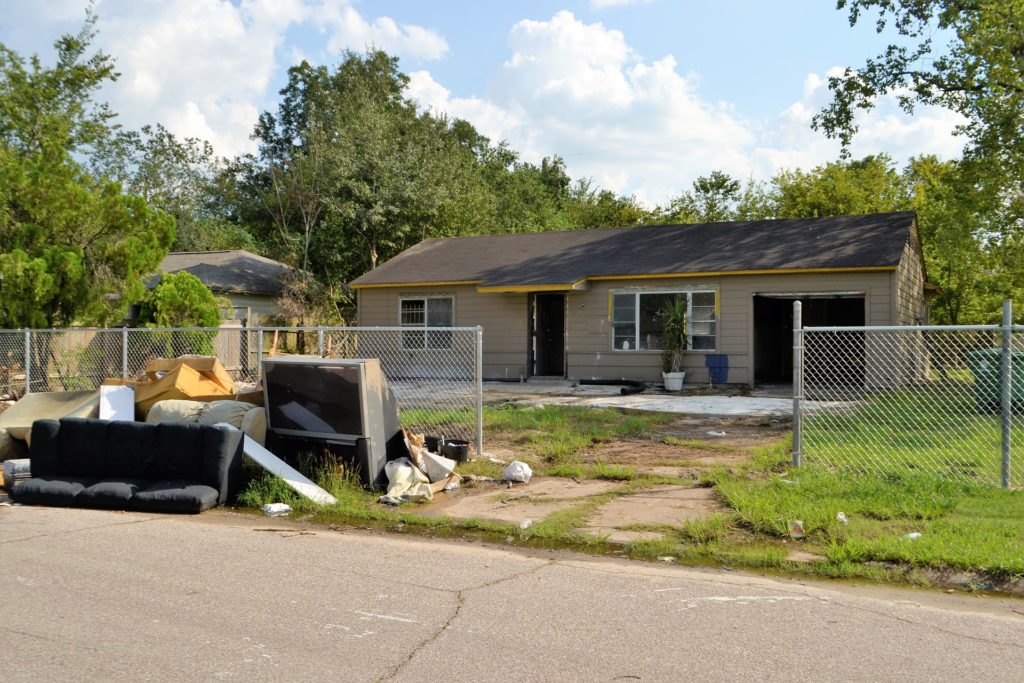
You may dispose of a tenant’s abandoned property but of course you will need to follow a strict process.
If you believe the tenant has no intention of claiming their property you must give written notice that you intend to dispose of it. You must give your tenant 30 days from the day you mail the notice to come and pick up their property. Mobile homes require 75 day notice.
The tenant is required to pay reasonable storage and transportation costs. Good luck getting that back.
New Jersey Eviction Process – Costs To Evict a Tenant In NJ
All landlords know that evictions are expensive but the costs can vary widely depending on where you do business and how long the process takes. Tenant-Friendly states where the process takes longer will cost you more. Also, if you are evicting for cause other than non-payment of rent, the process is more complicated and will cost more.
Landlordology estimates the true cost to evict a tenant to be over $5,000.
Below is a breakdown of the estimated eviction costs in New Jersey.
Costs to File An Eviction In New Jersey
| DESCRIPTION | COSTS |
|---|---|
| Complaint Filing Fee | $50 + $5/Add’l Tenant |
| Summons Delivery Mileage Fee | Up To $25 |
| Warrant for Removal Fee | $35 |
| Tenant Removal Mileage Fee | Up To $25 |
| Lockout Fee | $50 |
| Locksmith | $150 |
| Lawyer Fees | $500 – $1,500 |
| Lost Rent (2 Months) | $2,500 |
| Repairs & Maintenance | ??? |
- It will cost $50 to file an eviction complaint for one defendant and $5 for each additional defendant
- You will also need to pay up to $25 for a Special Civil Part Officer to deliver the summons and complaint
- A Warrant for Removal filing will cost $35
- A sheriff lockout will cost $50 plus mileage
- Locksmith will cost about $150
- Storage fees will run about $150/month depending on the size of the rental and contents
- A lawyer will cost a minimum of $500 and it is mandatory if the rental is owned by an LLC or corporation
- Lost rent will cost about $2,500 for 2 months based on median rents
- This doesn’t include any tenant damage on the way out!
As you can see, a New Jersey vacancy can easily run you $3,500 or more depending on how easily the tenant leaves and how long the process takes.
Time And Money-Saving Tips To Following The New Jersey Eviction Process
Here are some tips I’ve gathered from experts on how to minimize time and costs during the New Jersey eviction process.
Avoid Problem Tenants

Of course preventing an eviction is the best way to save money on evictions. A thorough screening process is your best defense but it isn’t foolproof. Even good tenants can go bad due to a change in job status or any number of reasons. Still, history is a good indicator of future behavior. Weed out any potential tenants who exhibit major red flags such as previous eviction, poor credit, moving too often, etc.
Customize Your Lease
One of the best things you can do is to make a custom lease. Never use a basic lease you found on the internet because it probably won’t protect you like you think it will. Your lease often decides the outcome of tenant disputes so it’s important to have a strong, custom, and state-compliant one. The Landlord’s Guide to Writing Great Leases can show you how to create a custom lease in a day.
Encourage Your Tenant To Leave Before The Eviction Hearing
Despite your best efforts in choosing a great tenant, eventually you will need to proceed with an eviction. The sooner you can convince your tenant that it’s in their best interest to leave, the better off you are financially and mentally. In fact, most cases never make it through the entire eviction process. Many are resolved before the eviction hearing.
You can learn the techniques that experienced landlords have mastered to communicate with their tenants and convince them to leave before being forcibly removed by a court officer.
I recommend the Landlord’s Eviction Handbook by Landlord Guidance. You will find chapters devoted to communicating with your tenant and how to encourage them to leave voluntarily. It’s a great resource to have on hand whether you’ve never experienced an eviction before or want to avoid your next one.
Use State-Specific Forms
Most states require very specific wording when communicating with tenants during the eviction process. Be sure you comply with your state’s legal requirements when sending notices to tenants. Don’t just download any old form from the Internet. Be sure it conforms with your state’s requirements.
There are two popular online, state-specific landlord form providers that I like:
ezlandlordForms ($38*)
- Includes state-specific language
- Customizable
- Use as many forms as necessary for 30 days
* ezLandlordForms prices are for one unit. Additional units can be added for a small fee.
Good news! AccidentalRental readers can save 15% with my promo code.
Law Depot ($33.00)
- State-specific language
- Editable and Reusable
- Free 7-day Trial
- $10,000 Legal Guarantee
Don’t Hesitate To File A Complaint
We all want to be fair and give our tenant a chance to pay their rent or correct the lease violation. This is especially true for otherwise excellent tenants. But delaying the process only hurts you. Be fair and transparent yet firm.
Don’t give in to your tenant’s excuses. You want to be fair if your tenant can’t pay the rent this month but that doesn’t mean you can let them be late on rent. You need to start the eviction process once the grace period has passed.
Let your tenant know that you are filing in accordance with the state laws to protect yourself and will withdraw the complaint once they pay. Here’s a sample script you can use.
“I’m sorry Tenant. While I understand you intend to pay me on the 10th when you get paid, I must file the required court paperwork until you pay in order to protect myself. I will withdraw the complaint immediately upon receipt of full payment. I appreciate your understanding.”
If your rent is about $1,200 per month, every day you delay will cost you about $40 in lost rent. More importantly, you will be setting a precedent that the judge will consider when deciding if you can legally evict your tenant. Don’t hesitate. Start the paperwork as soon as legally possible.
Document Your Rent Collection Process
You need to demonstrate to the judge that your tenant in fact was late or did not pay rent. I use Cozy (now Apartments.com) for many reasons including the fact that rent collection is documented. You will have a verifiable record of when rent was due and when it was paid. (By the way – I’ve never had a late payment since I switched to Cozy!).
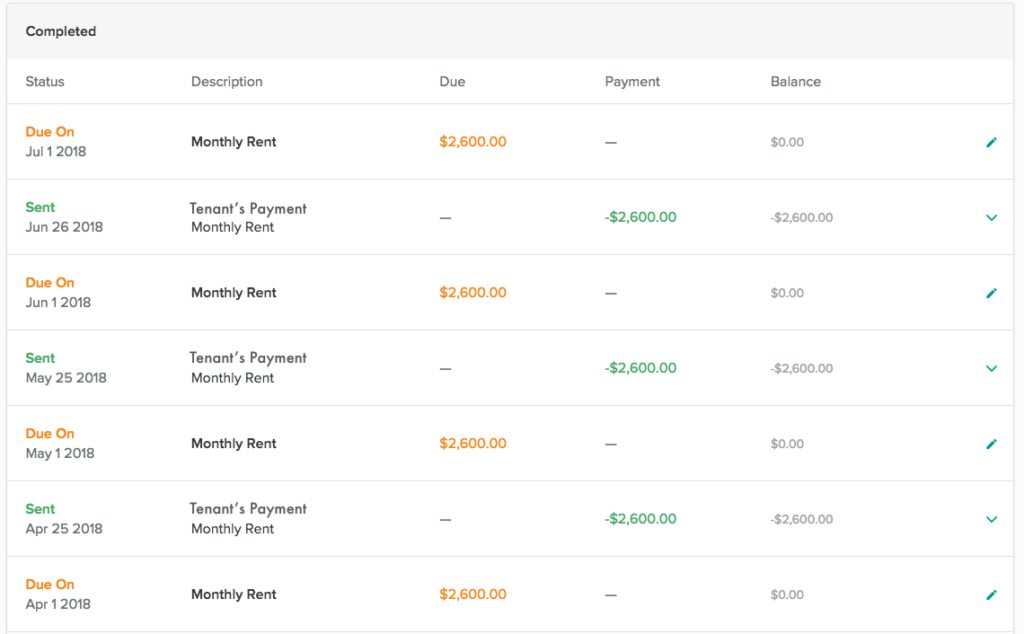
Whatever system you use to record and collect rents be sure it is up to date and verifiable. If you collect checks, bring records of bank deposits and cancelled tenant checks showing the date the check was issued and cashed.
Document Tenant Interactions

Be sure to document all tenant interactions and to write down verbal conversations with tenants. A property management system will automatically document some interactions like maintenance requests. Cozy, for example, lets you upload photos of the problem and the resolution so there is a solid record of your compliance with your obligations as a landlord.
Verbal Agreements – If you make a verbal agreement with a tenant, be sure to follow it up in an email or letter so there is no confusion and you have a record of the discussion.
Certified Mail – When dealing with a difficult tenant or if you are beginning the eviction process, switch to formal letters and certified mail.
Establish communication preferences – It’s important to establish a preferred method of communicating with tenants. This way, the tenant can’t say they didn’t get the memo.
Landlord Guidance also offers the following pro tip.
Enforce Late Fees
Charge a late fee immediately after the grace period if applicable. Don’t give in to the temptation to waive it just this once. You will establish a pattern of leniency and some tenants will take advantage of you. It will also lengthen the eviction process in NJ. You need to show a pattern of late payments to evict for this cause. You can’t establish a pattern if you don’t enforce the lease terms consistently.
Landlord Guidance also offers the following pro tip.
Register With Local Authorities
One of the first things the judge will do is ask if you are compliant with the laws requiring landlords to register with the state and the municipality (if applicable). If not, your complaint will be thrown out and you will have to start over. The New Jersey Landlord Identity Law is very clear:
46:8-33. Action for possession by landlord; compliance with act
In any action for possession instituted by a landlord who has failed to comply with the provisions of this act, no judgment for possession shall be entered until there has been compliance. The court shall continue such case for up to 90 days and if there has not been compliance within such period, the action shall be dismissed.
You can sign up using this NJ form.
Want to Learn More?
My book, The Accidental Rental, has a chapter dedicated to handling evictions the right way, including legal forms. The Accidental Rental will show you how to get rid of your bad tenant step-by-step!
Get Legal Help

We Accidental Landlords usually want to do things for ourselves both to learn and to save money. This is one area where that strategy may backfire. It’s a very expensive lesson to learn when you are facing thousands in eviction costs. You should work with a lawyer if this is the first time navigating the eviction process.
Even experienced landlords should consider using a lawyer in the following situations:
- Tenant has legal aid or a lawyer
- Tenant is in a protected class
- You are unsure of the process in a new jurisdiction
Find NJ Eviction Lawyers
Not sure how to proceed? I can help you find an experienced NJ eviction attorney. Just fill out this form to have a NJ lawyer review your information for free. No obligation.
Ask A Lawyer Online Now
Need a quick answer from a legal expert but don’t want to retain an attorney?
Try Rocket Lawyer’s Ask-A-Lawyer service (affiliate partner). Their on-call network of lawyers can answer your question fast without the high fees.
Conclusion
Nobody likes evictions but they are inevitable if you are going to be a landlord. Understanding the eviction process in your state is crucial to successful evictions.
The New Jersey eviction process is more complicated than most other states. It’s important to strictly follow the process in order to minimize time and costs. This means sending your tenant NJ-specific forms and notices that include the specific wording the judge will want to see.
It also pays to know what to expect if your case does make it all the way to the NJ court system. Be prepared to provide solid evidence of your complaint. You will also be asked to work something out with the tenant before seeing the judge. Know what you are willing to accept.
Evictions are expensive. The more tenant-friendly the state or jurisdiction, the more expensive the eviction process will be. New Jersey is no exception. You can expect to spend at least $3,500 or more to evict a tenant.
Follow tips from the experts to save time and money. Take advantage of experienced landlords and resources that can help you encourage your delinquent tenant to comply with the lease or even avoid the situation in the first place. Resources like Law Depot and ezLandlordForms can help. Check them out.
Also, sure to read part one and part two in this 3-part series on New Jersey evictions to be fully prepared!
Want More Landlord Tips?
Sign up today for the Accidental Rental newsletter for access to more free money saving tips and tricks including my latest free bonus gift!


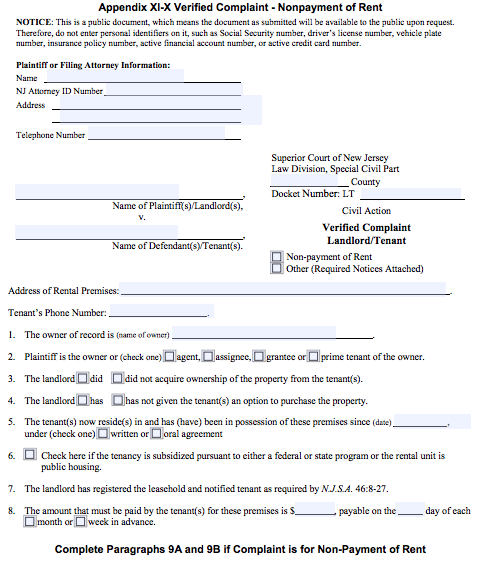
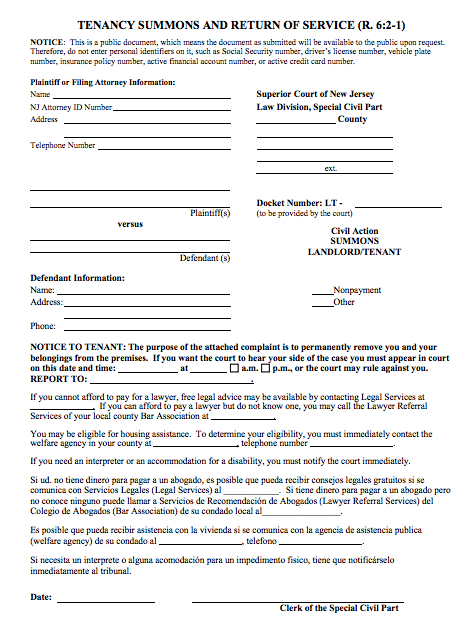
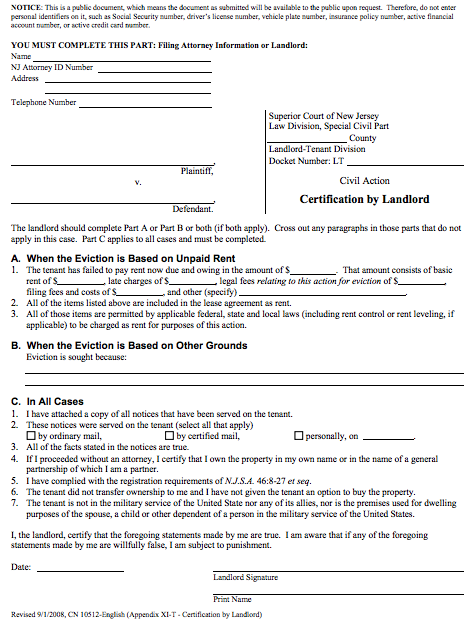


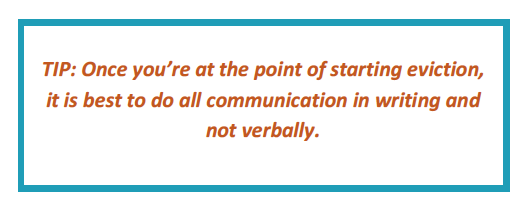
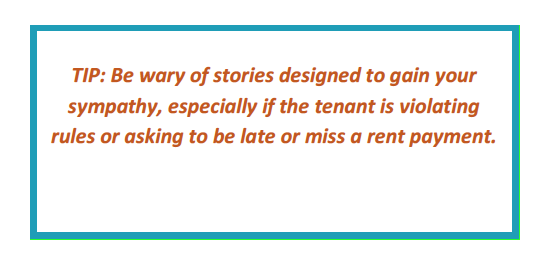



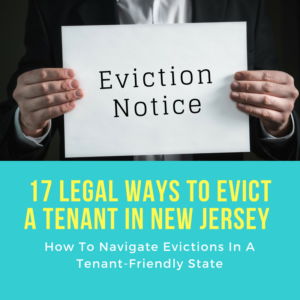
I’m a tenant I’ve been living at a beautiful town home on the water in New Jersey I’ve been here approximately eight months last months unfortunately I can only give a partial payment to my landlord. My monthly rent is 1880 a month and I gave him $1400 with the promise I would give them the rest at the end of the month. A week after I gave them the partial payment I received an eviction letter from the court what can I do as a tenant in is that even legal after receiving the partial payment
Please don’t take this as legal advice because I’m not a lawyer but I think the only thing you can do to ensure you will not get evicted is to make the rest of the payment quickly and hope your landlord accepts it. Evictions are serious and you should get professional, local advice.
That being said, the eviction notice should clearly state why your landlord is pursing the eviction. Read that notice carefully and make sure you comply with its instructions. I believe that would be your best defense. I suspect your landlord is just starting the eviction now in case you don’t make the remaining payment.
Search your county website and speak to the clerks that manage the evictions. They will be able to help or point you to some legal assistance if you have more questions.
What if the tenant does not follow up with the settlement. Does the warrant have to be served again with the 3 days and the +7 days
I’m not sure exactly. Did you go to court and reach a settlement? Was the complaint dismissed? Did you file the proper form?
I think you need to file a certification of the judgement if they didn’t live up to the agreement. Then you can move forward with the warrant for removal.
Definitely consult a local attorney as this is beyond the scope of my knowledge. Good luck!
What if your agreement was not signed by a judge but just the landlord and tenant.
I’m not sure. I believe the settlement needs to be reviewed and approved by the judge but you should consult a local attorney to be certain.
Dude. Just wanted to drop a note of thanks for the levity this site granted me. I started the page fuming at the situation I’m dealing with, involving decidedly “unreasonable” Tenants raising “issues” well outside of the reasonable man standard in re: some minor noises emanating from an upstairs neighbor, to the point they wish to break the lease < 2 weeks from first raising the issue. By the time I was to "Jack Tripper" I was already grinning. Thank you!
Thanks! Glad I could help in any way. Dealing with stubborn tenants can be tough. It helps to just laugh sometimes.
in nj what happens if lanlord failed to do lockout after 7 day orderly removal and tenant is still in property 30 days if not more without any further contact from lanlord
In that case the landlord has to notify the tenant and go back to the court to ask permission to follow through on the eviction. Source.
Does this only apply after 30 days or is the actual time frame shorter. For orderly removal. Person still in apartment after 7 days
Sorry but I’m not sure I understand your question. It’s probably best to get legal advice on this.
Landlord wants me to move claiming she is moving in. But she just wants to control who comes in & out my home. I don’t have a lease & she’s giving me 3 months to move. Do I have to move or does she need to also file with the court?
Your landlord only needs to give you 30 days notice since you do not have a written lease. She’s being very generous. I would take advantage of the time to look for a new place. She can evict you after 30 days if she wants.
hi my wife rented one room in one family home to one lady, who filed harrashment case against my wife when she gone to collect rent, then she said, she met with accident so can’t vacate and now saying she will move 15 or later.. each month new date.. tired.. what we do.. also i see that she had broken car, that she was driven and now she has new. She told me that she got it from insurance company as someone came and hit her car and she filed law suit
Is this your personal home? If so, you have more rights. If not, you will have to show good cause. Has she been late with rent or has she always paid on time? If she’s been late or hasn’t paid rent then you will have a strong case.
In NJ if you mail a notice to quit and accept partial payments after the notice was sent is the notice void? Do you have to start over?
It’s not as straight forward as that. It depends on the cause for eviction and when you accept the partial payment. According to some legal experts, you can accept partial payment if you are evicting for non-payment of rent up until the judgement for possession. After the judgement, then you shouldn’t accept a partial payment unless it is documented and recorded with the court or you are considered to be waiving the judgment.
It’s different for other causes for eviction. If you give a notice to quit for something other than non-payment of rent then you must specify a date by which the lease is considered terminated if the tenant hasn’t cured the situation. Accepting partial payment after that date could jeopardize your eviction case.
I hope that helps but please see a local lawyer because I am not a legal professional and your jurisdiction may have different case law which could change this scenario. Good luck!
I (the landlord) have tenants on the first floor of single family house and live in the finished basement. My tenant has not made this months rent payment and does their lease was not renewed because of prior late payment history. Do I have proper grounds for eviction? I have also given them a notice to quit a few months ago for late payment but they paid the rent in full immediately after. Thanks!
Yes I believe you can terminate the lease (you live in the duplex) but you still need to follow the correct procedures and give 3 month’s notice to terminate if they have a year to year lease. Otherwise 30 days should be sufficient. If they overstay, then you can file for eviction. However, consult a local lawyer to be sure you follow the procedure in your county otherwise it could get thrown out on a technicality.
My 35-year-old grandson has lived in my home since his birth. For the past 2 years, I have only charged him $400.00 a month to live here. Prior to that, it was $200.00. Now he is not paying and making excuses. I want him out of my house. He will not leave saying I must legally evict him. As of this week, he owes me $500.00. What is my recourse?
It seems like you have a landlord-tenant relationship because he is paying you in exchange for housing. You do need to follow the eviction process. Document that he’s not paying, serve notice and file a complaint.
I am unfortunately being evicted due to non payment due to health issues. The court summons states that my rent is $1720 however it was increased at the end of the least term by $25. I was informed of the increase via email and didn’t actually sign a new lease. Would the discrepancy in rent amount be something that could buy me more time with the court?
Sorry to hear about your health issues. I’m not a lawyer experienced in these matters but I don’t think the rent discrepancy is likely to be much of an issue. It sounds like your landlord is requesting the old amount which conforms to the last written executed lease agreement. While I could see a sympathetic judge potentially dismiss it based on the technicality, I wouldn’t count on it.
If the landlord is successful in winning a judgement for possession then I believe you can petition for an orderly removal which will grant you another 7 days but that’s about it. I’m not sure you can stay much longer without paying the rent.
I would come to the court proceedings prepared to document why you are no longer able to afford the rent. If you are an otherwise good tenant, your landlord may be willing to accept a payment plan instead of an eviction. This is probably your best option in my opinion but you should seek professional council to help.
I am selling my rental house, tenant is a vet,who is disabled,15 years on time rent,,can I evict him ?,need to put new rugs in,before I sell,or turn into Airbnb.
No. You will need to wait for the lease to end, offer a renewal at a higher rent and hope he doesn’t renew. If he fails to pay the increased rent then you can file for eviction but his disability may complicate things. Speak to a local lawyer to get expert advice though.
I have a tenant living above me. Single family home duplex and she has a yearly lease. She’s gone down a bad path, fights and slams the doors, pounds on the floor, walls, and slams cabinets when she’s drunk. Severed her Notice to Cease the disturbance on that and a the fact she moved someone in with her. They fight loud and I’ve been warning her over and over about the noise. She let me know to let her know via email the other night to contact her if they were too loud again. I sent her a mail and she berated me back instantly and said no banging or noise had happened., it was 2am She swore the guy would be out by the CEASE date but he’s not. She swore no more noise but pounding again tonight. Just enough to annoy me but not enough I would call the police. We suggested she move out within 3 months but I’ve had enough. Do I serve notice to quit now, and how long do I have to live in this hell? I haven’t slept in a week and is there a fast track for issues like this? The worst is, we have a common area the mail comes in and I’m sure the guy she brought in is stealing mine. Two weeks with no mail raised my hair so I put a camera up out front. I can see the mailman put the mail in the slot but I receive nothing. I’m not able to put a camera in the small vestibule so I’m kinda screwed until this guy is out.
Hi Scott. I don’t know of any way to fast track an eviction for lease violations but there could be since you are a live-in landlord. If there isn’t though, you are easily looking at 2 months (1 month to service notice and 1 month to process the eviction) assuming you are successful. I would get a local lawyer if you want to make it go as fast as possible. I believe the next step is to serve Notice to Quit ASAP.
Gather all of your documentation. Record every time they are loud, get evidence of this guy living there (in violation of the lease?). Build the case that she is breaking the lease and you might have a chance.
I’d also have the mail held at the PO until the eviction. It sounds like you don’t have video of them actually stealing mail so I don’t think that will do much for your case.
Did you get her to sign anything saying she will be out in 3 months? If not, you may have a hard time enforcing that when the time comes. As a live in landlord you have the right to not renew her lease without good cause but that requires a 3 month Notice to Quit.
If ur tenant has a month to month lease with you then you only need to give them 30 days notice of non renewal of the lease and u dont need to give a reason. That’s what both lawyers said that I asked. I live with my sub tenants and its a living he’ll and they are putting me at great risk 4 covid & I hate them but with the eviction bans who knows how much longer I’ll have 2 be held hostage here. I have a month to month lease with my landlords (my tenants arent on the lease obvi but they are on the CO. We had a written agreement but no 1 ended up signing it cuz my printer broke blah blah) I was going 2 move in with my mom eventho ive been here for yrs longer than these people and its MY place but I was that desperate but even if I move out I’m still responsible for them and they already said they wont leave if i move out! They r just gonna stay here and screw me over after everything ive done 4 them. Evil evil people
What happens if you moved out before eviction was filed? No longer reside there but landlord filed eviction anyways. I still owe a months rent though.
If you move out then the landlord won’t need to file for eviction. However, if you owe money it can still affect your ability to rent in the future. I’m not a lawyer so this isn’t legal advice but I think the best thing to do is respond to any notices and pay any rent due. If you do that and if you’ve left the house in good shape, then your landlord will have no reason to take you to court for eviction or small claims. That’s the best way to avoid any issues on your credit and background history. Good luck!
Tenant here who exercised their right to Repair and Deduct in June of 2019. In September of 2019 received a letter from an attorney as an “attempt to collect a rental arrears debt plus late fee” for the amount that was deducted in June. Responded with all documentation and then 10 days later received a “Notice to Cease” with a vague list of 14 things the landlord considered disorderly conduct- all based on “reason to believe”. There were no specifics, dates, which tenant was responsible for said allegation, so responded with appropriate letter, explaining that we did not know anything about these “actions” as they were apparently heresy and the notice was clearly an act of Reprisal on behalf of landlord. We requested that the landlord please provide us with information regarding our Security Deposit (we had requested this information the year prior and the landlord blew us off) as well as the amount of interest that had been earned in the 5+ years of our tenancy. This request went ignored again. So after 30 days (actually it had been 14 months since our first request) we notified the landlord that we were exercising our right to have the Security Deposit plus 7% Interest to the following 2 months rent. We heard nothing in return. We just now received a Summons for Eviction for Non-Payment of 6/19, 1/20 and 2/20 (please note all other rent payments in between were made on time and cashed by the landlord. How in the world can this be a case of non-payment? We met with an attorney, followed their directions, never got responses to any of these things and now enter a request for possession, back rent, late fees and legal fees. This can’t possibly be something any judge would entertain, is it? The Attorney didn’t even provide the court with a copy of the lease, nor have we ever been provided with the Landlord Identity Registration since signing our lease September 1, 2014. We know this is all Reprisal, but do not appreciate being slandered or harassed with false claims. Thoughts?
There’s a lot going on here but it sounds like you clearly understand your rights. I’m not a legal expert but will give you my thoughts. Your landlord is using the non-payment of rent as the cause for eviction. I think you will need to demonstrate the actions you took under the law to “pay” the rent. First for the repair and deduct and again the 2 months of rent using the security deposit. However, it’s not clear that you had enough in the security deposit to cover 2 months of rent. Max SD is 1.5 months. Did the SD + 7% interest cover the full 2 months? If not, then I think there may be a non-payment issue.
Also, look to see if the landlord is registered. If not, the judge will throw the case out and tell the landlord to come back after he registers the property.
Practically speaking though I’d look for another place to live. It’s not worth the headache and stress to live with a landlord who doesn’t want you.
I own a 2 family house. I rent all 6 rooms on a short term rental platform like Airbnb and VRBO and I avoid having any guest stay for more than 28 days on a single booking.
I have them complete and sign a registration form that states thier full name, check in checkout date, thier primary place of residence
If the want to continue I have them rebook.
There is no lease.
My question to you is.
does this make them a tenant?
That is an excellent question! There is no lease but presumably they agree to something when they book through one of those sites that gives them certain limited rights. I’ve heard many people say that a guest who stays for 30 days becomes a tenant but I don’t think NJ has a law like that. I believe it’s determined by local laws and case law. See what your local municipality has on the books regarding short term rentals and such. It might be a good question for Rocket Lawyer to make sure you are covered in your agreements.
I was evicted at the beginning of feb for non payment of january and partial dec, is it legal for the landlord to chsrge me feb and march rents even after being evicted?
I think it depends. Are you still in the property? Has your landlord received a judgement for possession? A warrant for removal? I don’t know the answer but I’m guessing the landlord is not allowed to charge for rent after the judgement for possession but please consult a legal professional to get the answer for your specific situation.
I have a tenet that hasn’t pay their rent since the 1, of December 2020. Its past 15 days now, I’m calling and texting the tenets I’m getting no response from them (tenets). Their lease has been expired on August 31, I had issued the new least to my tenets in September which the tents had never sign. I gave them a letter stating their late rent and late fee on Monday, December 14, I’m heading to the post office to resend the letter of notice to pay and quite 30 day notice by certified mail and heading to the court house today to filed for an eviction notice. Do I need a lawyer? Is there anything else I need to know?
It sounds like you have a month to month tenant. In NJ, you do not need to file a Pay or Quit notice. You can file for the eviction as soon as they are late according to your lease or the law (for example, Section 8 requires 14 day notice) but it’s always a good idea to give an official notice. You don’t need a lawyer to represent you unless your property is owned by a LLC., trust or corporation.
All of this is subject to the current eviction moratorium of course. The clerk at the courthouse should be able to tell you what the process is these days. Gather your documentation and be prepared to have a non-paying tenant for a while.
Have they been responsive since August or was that the last time you heard from them? Two weeks late is not the end of the world as long as you can connect with them and work something out. Have you visited the rental at a time when they are normally home? That might be your best chance of working through this situation quickly.
Thank you so much. The process is so confusing and this step by step article is really helpful! I have one question, my property is registered with my town in NJ but I lost my copy. Who do I contact to get a copy of it for my next tenant? Thanks so much!
Glad it helped! Who to contact would depend on the town. Some towns have a rent control office others register through the building department. A quick call to the town clerk or administrator’s office should clear it up.
Have a tenant who hasn’t pay rent for 1 year they have grown kids with disability’s government pretty sure helps with money for rent. We haven’t been able to do anything because of the pandemic. She claims we can’t not evict her because of her kids. Please need advise
It sounds like you have a complicated case and you should probably seek legal council. You can use this form to find a NJ landlord-tenant law expert.
Thank you so much for answering!
We will get legal help.
Blessings.
Signed a lease and just moved into a condo. Just after unloading the last box, the President of the HOA told us we have 15 days to move out. Landlord can not lease the condo he has to live in the unit for 2 years. What are our rights? We have no place to go, there are no rentals and we do not want to buy in the outrageous buyers market. The fine for the landlord is $5000 now and another $5000 the first of the year. Landlord suggested we buy it from him. With a profit from what he paid, when we moved in the gas was off and the sink was broken in the kitchen. Cabinet doors were off and drawers were off and broken. No bottoms! We were promised it would be fixed. What are our rights??? Your talking about landlords what the heck about a tenant who can’t find another rental in today’s world. Waiting lists for months!!!!kicker the real estate listing had it right on there when he bought it that he had to live in the unit for 2 years. How did the realtor get away with listing it as a rental and how did he? Got an appointment for legal council. How does a unit pass and get a final CO with no gas for heat and no cabinets and under sink bottom gone? And pipe leaking? Had to have it professionally cleaned dead flys everywhere.
Sorry. That sounds like a nightmare situation. Unfortunately, I don’t think you have much recourse expect to get your funds back and try to find another rental. The market tends to slow down this time of year so you might be able to find good deals. Best of luck!
I would like to ask a question: I helped a friend with a month to month lease because she and her husband lost their home and became homeless and this was only for few months but then Covid came and now, 3 years later they still refuse to leave. They are over 60 and the husband is intimidating me. They refused maintenance on the house and repairs and broke toilet causing water damage and also damaged the entire house laminate flooring with dog urine and moved all their storage units into tiny house causing risk structurally etc. thousands in damages. They are claiming they can stay forever and that they now own part of my house! My house was newly renovated and it pristine beautiful condition day they moved in. They keep claiming health issues and covid and renters rights while costing me thousands in damage and I gave them rent free for 4 months to save to move with a notice to quit for January 1 when their moratorium ends. (the moratorium harming so many small home owners) They took it but they are refusing to even try to move. I need my home and to fix the water damage to studs removing the subfloor to cure. Will it be easy to get them evicted considering this is a month to month lease that is now a holdover? I never registered as a rental due to this was just to help a friend in my house. I do not live there since they came there. They are causing extreme ongoing stress, intimidation and financial burden, damage and the husband makes negotiating and communication difficult and the wife screams at me. Would a judge understand I need them out fast before mold takes hold. This house is all I have. this is devastating me. I would be grateful for your thoughts. Michelle
It’s not clear if you have a written lease but it sounds like you no longer live in the same house so you can only evict for Good Cause.
You can attempt to evict them now for a lease violation as these types of evictions are now back to normal in NJ but it will be very difficult without a written lease.
Alternatively, you can evict for non-payment. These evictions are starting to work their way through the system now. There is an income limitation still in place for non-payment evictions until December but then that option will open up as well unless something changes. It’s best to speak to a lawyer and file the appropriate eviction type ASAP to minimize your losses.
Question:
Landlord filed an eviction indicating I owe him rent from 2018.
The eviction is retaliatory in nature because my home was inhabitable because of his failure to make repairs, I had to call the housing inspector. It was not until after this he decided to file an eviction from the non-payment of rent.
In the meantime I found out the property was not even registered as a rental in the 14 years out of the 15 years that I have lived here. Landlord only registered AFTER he received fines for failure to make repairs and failure to register the rental. It was not until after this that he decided to file an eviction for allegedly owing rent from 4 years ago.
Aside from the fact that in 2018 I did repair and deduct, with his (verbal) permission, which accounts why he did not get that months rent, repairs actually cost slightly more than my rent but I did not deduct anything from the following month.
I have now read that a landlord cannot
even collect rent on what is deemed an illegal rental. Even though it is now registered, it was not registered in 2018.
I also found out the landlord has taking out multiple mortgages on the property and has tax liens which clearly means he’s severely in debt which I believe the reason he is trying to evict me is only a small part due to retaliation but more notably, because is he wants to raise the rent by 600 a month which is not legal on a current tenant, however he would be allowed to raise it that much (or even more) on a new tenancy.
Honestly all those details are irrelevant because I had good reason for not paying rent back in 2018 due to the repair and deduct.
*** BUT my question is, is it even legal to file an eviction for alleged owed rent going back that far (4 years) ????
I mean there’s a statue of limitations on everything else, is there a statue of limitations on how much time a landlord has to pursue back rent?
I’ll preface this by saying I’m not a lawyer and you should seek proper legal advice.
I’m not aware of any statute of limitations on collecting back rent. However, I’m sure the judge would question why the landlord is seeking the payment now. That said, if the landlord can demonstrate that you do owe money, judges are obliged to rule in favor of the landlord. They don’t have much discretion when it comes to non-payment. His debt is irrelevant.
Unless the unit is rent controlled, he can raise the rent by any amount that isn’t “unconscionable.” $600 seems like a steep increase but it’s up to a judge to decide if that is excessive given the circumstances.
As for the lack of registration, that doesn’t necessarily mean the unit is illegal. It only means that it wasn’t registered. The landlord probably had to register the rental in order to clear the violations you mentioned. It’s also a prerequisite to filing for an eviction so maybe that was part of the reason as well. I would seek legal council in this situation.
hi, I have 2 family house, I rent the first floor and I live on the 2nd floor, their lease ends on may 31,22
My daughter is moving back home so I need the first floor for her.
Can I evict my tenant for this reason, they have 2 little girls, but I need the apartment for my daughter.
Please let me your thoughts and also what is the best way to handle this issue.
Julia
You would likely fall under one of the few exceptions to the anti eviction laws in NJ. As long as you live in one of the units and the property is registered, you can file for an eviction for virtually any reason. Send a proper notice according to your lease that you are terminating the lease as of May 31. If they refuse to leave, you would likely win in the eviction case. Personally, I would give them as much notice as possible and let them terminate early if needed. I hope that helps!
Hi. if I give my month to month tenant a 60 day notice to vacate because I’m going to use it personally, can I sell it after 6 months? Thank you
I believe you have to actually intend to live there and I’m not aware of any restrictions on selling after that but they may exist. However, you don’t have to move in, you can evict a tenant to sell the property but the requirements are very specific. Either way, I would consult an attorney to get the best advice for your specific situation.
Can I be evicted for having a esa
No. You can’t be evicted for having a legitimate ESA if your landlord is required to let you have one. However, some landlords are exempt from this requirement and you are still responsible for any damage done by your ESA. So if your ESA is causing damage or breaking rules and you don’t correct the situation, you could be evicted after receiving notice from the landlord. I don’t know your specific situation though. You should get professional advice if you are facing an eviction.